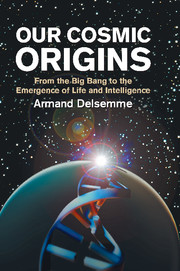Book contents
- Frontmatter
- Contents
- Foreword
- Preface
- Acknowledgments
- 1 Locating humans in the Universe
- 2 The race toward complexity
- 3 The stellar alchemy of metals
- 4 The formation of the planets
- 5 The emergence of life
- 6 The history of life
- 7 The awakening of intelligence
- 8 The other worlds
- 9 Perspectives
- APPENDIX A The standard model of the physics of elementary particles
- APPENDIX B Symmetry in physics
- APPENDIX C The strange role of time in relativity
- APPENDIX D The measurement of long time spans and the age of the Universe
- APPENDIX E The standard model of the Big Bang
- APPENDIX F The cause of the Big Bang and inflation
- APPENDIX G Chirality
- Glossary
- Bibliography
- Figure index
- Table index
- Name index
- Subject index
Preface
Published online by Cambridge University Press: 05 August 2012
- Frontmatter
- Contents
- Foreword
- Preface
- Acknowledgments
- 1 Locating humans in the Universe
- 2 The race toward complexity
- 3 The stellar alchemy of metals
- 4 The formation of the planets
- 5 The emergence of life
- 6 The history of life
- 7 The awakening of intelligence
- 8 The other worlds
- 9 Perspectives
- APPENDIX A The standard model of the physics of elementary particles
- APPENDIX B Symmetry in physics
- APPENDIX C The strange role of time in relativity
- APPENDIX D The measurement of long time spans and the age of the Universe
- APPENDIX E The standard model of the Big Bang
- APPENDIX F The cause of the Big Bang and inflation
- APPENDIX G Chirality
- Glossary
- Bibliography
- Figure index
- Table index
- Name index
- Subject index
Summary
Humankind has just awoken to the cosmic origins of the human adventure and I have striven to reconstruct this story as science now sees it. In order to keep it accessible to the enquiring reader, I have not used mathematics but followed the thread of chronology.
Recently, it has become possible to tell this story without leaving too many gaps. At the beginning of this century, the different natural sciences, originating in the same discipline of natural philosophy, had become specialized; they were cut off from one another. Now, physics, cosmology, astronomy, chemistry, geology, paleontology, biochemistry and biology are coming together again.
So my thread follows the Universe from the moment of its beginning; I tell how its expansion led to the formation of the galaxies and stars. The pursuit of the thread shows us how life could finally emerge, through the most probable cosmic processes, while using the most abundant elements made in the crucible of the stars' cores.
I have tried to keep the story simple; I cannot say that I have always succeeded. Occasionally, I had to cut short explanations that might have become tedious. The pages that seem too difficult can be skipped; in order to help the reader to follow the thread to the final goal, I have tried to give short summaries throughout the book.
The purpose of the first chapter is to familiarize the reader with the extremely large and the extremely small.
- Type
- Chapter
- Information
- Our Cosmic OriginsFrom the Big Bang to the Emergence of Life and Intelligence, pp. xv - xviiPublisher: Cambridge University PressPrint publication year: 1998



